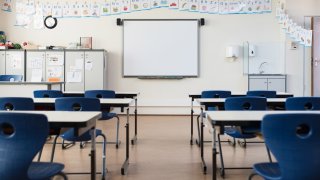
New Hampshire on Tuesday released guidance to schools on when to transition between in-person, remote and hybrid learning based on levels of COVID-19 cases in communities and schools.
The guidance specified conditions under which schools should hold in-person classes and those under which health officials believe it would be safer to teach students remotely or in a hybrid model.
It also provides guidance about when officials believe schools should transition between the learning models. However, the guidance leaves those decisions up to school districts to decide.
A matrix devised by health officials suggests that when the impact of the coronavirus on a school is deemed as "low," and the impact on the community is "minimal" or "moderate," that school can offer in-person learning. A school can offer in-person learning if the the impact on the school is "medium" but the impact on the community is minimal.
Schools should offer hybrid learning when the impact of the virus on the school is "high" and the level of community transmission is moderate; the school impact is medium and the community impact is moderate; and when the school impact is low and the community impact is "substantial."
Benjmin Chan, the state's top epidemiologist, said it was important to consider both the community impact and school impact when making decisions.
"We know that what happens in a community is going to effect what happens in schools," he said at press conference Tuesday.
"The purpose of releasing this guidance is simply to help schools make some informed decisions and use local data to help guide actions at the local level."
However, if the level of community transmission is high, the school should offer hybrid learning.
The state is leaving it up to each school district to decide whether to fully return to the classroom, continue with remote learning or develop hybrid models that combine elements of both.
Earlier guidance released by Gov. Chris Sununu had outlinesd recommendations for screening, social distancing, hygiene and other safety measures aimed at preventing further spread of the virus, but includes very few mandates. Sununu has emphasized the need to provide flexibility for districts that face different challenges and levels of risk.
As of Tuesday, the state had reported 7,275 cases of COVID-19, including 432 deaths.



